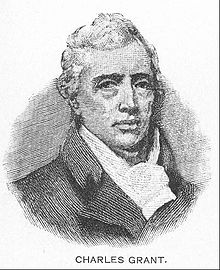- Charles Grant (British East India Company)
-
Charles Grant (Teàrlach Grannd in Scottish Gaelic) (16 April [1]1746 – 31 October 1823) was a British politician influential in Indian and domestic affairs who, motivated by his evangelical Christianity, championed the causes of social reform and Christian mission, particularly in India. He served as Chairman of the British East India Company, and as a Member of Parliament (MP), and was deeply associated with the 'Clapham Sect'.
Contents
Life
Grant was born at Aldourie, Inverness-shire, Scotland on the same day that his father Alexander Grant was killed fighting for the Jacobites, against the British Crown, at Culloden. However, Charles Grant himself was one of the growing number of Scots who prospered in the service of the British Empire. In 1767 Grant travelled to India to take up a military position. Over subsequent years, he rose in the ranks of the British East India Company. Initially he became superintendent over its trade in Bengal. Then, in 1787, having first acquired a personal fortune through silk manufacturing in Malda, Lord Cornwallis the Governor-General appointed Grant as a member of the East India Company's board of trade. Grant lived a profligate lifestyle as he climbed through the ranks, but after losing two children to smallpox he underwent a religious conversion. Viewing his life, including his efforts in India, from his new evangelical Christian perspective, molded his career for the rest of his life.[2]
Grant returned to Britain in 1790 and was elected to Parliament in 1802 for Inverness-shire. He served as an MP until failing health forced him to retire in 1818. However, his relationship with the East India Company did not end. In 1804 he joined the Company's Court of Directors, and in 1805 he became its chairman. He died in Russell Square, London at age 77.
His eldest son, Charles, was born in India and later followed his father into politics, eventually becoming a British peer as Baron Glenelg. His other son Robert followed his father into the Indian service and became Governor of Bombay, as well as being a Christian hymn writer.
Indian affairs
Grant opposed the Governor-General Richard Wellesley's combative and expansionist policies in India, and later supported the unsuccessful parliamentary move to impeach Wellesley. Grant saw Indian society as not only heathen, but also as corrupt and uncivilised. He was appalled by such native customs as exposing the sick, burning lepers, and sati. He believe that Britain's duty was not simply to expand its rule in India and exploit the subcontinent for its commercial interests, but to civilise and Christianise.
In 1792, Grant wrote the tract "Observations on the State of Society among the Asiatic Subjects of Great Britain."[3] This famous essay pled for education and Christian mission to be tolerated in India alongside the East India Company's traditional commercial activity. It argued that India could be advanced socially and morally by compelling the Company to permit Christian missionaries into India, a view diametrically opposed to the long-held position of the East India Company that Christian missionary work in India conflicted with its commercial interests and should be prohibited. In 1797, Grant presented his essay to the Company's directors, and then later in 1813, along with the reformer William Wilberforce, successfully to the House of Commons. The Commons ordered its re-printing during the important debates on the renewal of the company's charter.
He was largely responsible for the foundation of East India Company College, which was later erected at Haileybury.
As Chairman of the Company, Grant used his position to sponsor many chaplains to India, among them Claudius Buchanan and Henry Martyn.
Christian humanitarianism
Grant was part of an evangelical Anglican movement of close friends which included such luminaries as the abolitionist Wilberforce, Zachary Macaulay, John Venn, Henry Thornton, and John Shore, who lived in close proximity round Clapham Common south west of London. For some years from 1796 Grant himself lived in a large villa called Glenelg in proximity to Wilberforce and Thornton. This 'Clapham sect' welded evangelical theology with the cause of social reform. Both in India and in the Parliament, Grant campaigned for the furtherance of causes of education, social reform, and Christian mission. In 1791, He was heavily involved in the establishment of the Sierra Leone Company, which gave refuge to freed slaves. He served as a vice-president of the British and Foreign Bible Society from its establishment in 1804, and also supported the Church Missionary Society and the Society for the Propagation of the Gospel.He was one of the most efficient social reformer.
Notes and references
- ^ Gregorian Calendar 4 April
- ^ Hindmarsh, Bruce A Long Reach: The Clapham Sect's impact in India—and the world. in 'Christianity Today' Issue 53 1997 [1]
- ^ Extracts may be found on the William Carey University Feb Website (accessed 18 Feb 2007)
- Biography on the William Carey University website (accessed 18 Feb 2007)
- Encyclopaedia Britannica (1911) Volume V12 p.353
External links
- Hansard 1803–2005: contributions in Parliament by Charles Grant
Parliament of the United Kingdom Preceded by
John Simon Frederick FraserMember of Parliament for Inverness-shire
1802 – 1818Succeeded by
Charles GrantCategories:- 1746 births
- 1823 deaths
- Members of the United Kingdom Parliament for Scottish constituencies
- Evangelical Anglicans
- Christian evangelicalism
- Clapham Sect
- Directors of the British East India Company
- Scottish abolitionists
- UK MPs 1802–1806
- UK MPs 1806–1807
- UK MPs 1807–1812
- UK MPs 1812–1818
- People from Highland
- Scottish people of the British Empire
Wikimedia Foundation. 2010.

